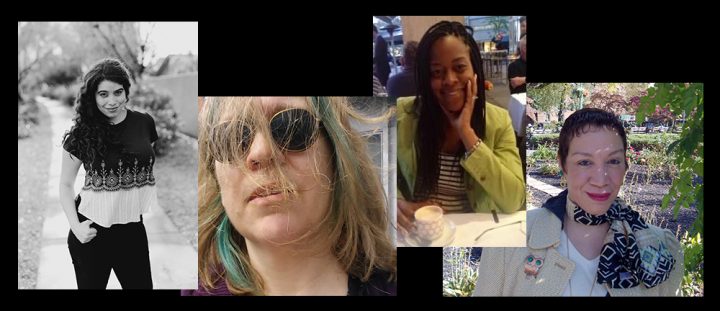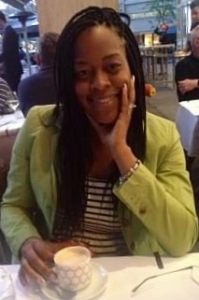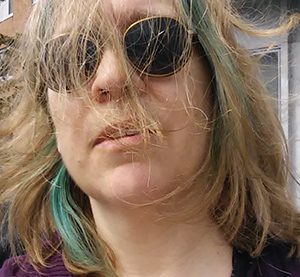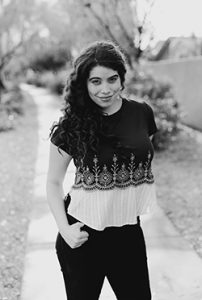By Jhon Sánchez
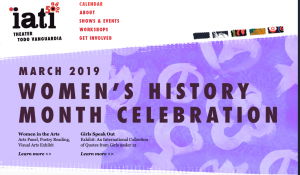 As soon as I searched for Women’s day on my browser, I got results like 34 Best Women Day Gifts, or Inspiring Gifts to Celebrate Women’s Day, or International Women’s Day Fruit Arrangements. I don’t want Women’s day to be turned into another Saint Valentin. I have nothing against gifts, but I believe we have to highlight the importance of March 8 th for its political, sociological, and economical context. For these reasons, I decided to interview five poets participating in the Celebration of the Women’s History Month organized by IATI. The event would be on March 10th at 3:00 PM in IATI Theater Studio, 64 E 4th Street, 2 FL in Manhattan.
As soon as I searched for Women’s day on my browser, I got results like 34 Best Women Day Gifts, or Inspiring Gifts to Celebrate Women’s Day, or International Women’s Day Fruit Arrangements. I don’t want Women’s day to be turned into another Saint Valentin. I have nothing against gifts, but I believe we have to highlight the importance of March 8 th for its political, sociological, and economical context. For these reasons, I decided to interview five poets participating in the Celebration of the Women’s History Month organized by IATI. The event would be on March 10th at 3:00 PM in IATI Theater Studio, 64 E 4th Street, 2 FL in Manhattan.
Desi Moreno-Penson
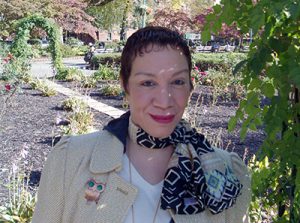 As a playwright how does your work portray the problems of women’s rights?
As a playwright how does your work portray the problems of women’s rights?
It’s funny, because I don’t necessarily view my female characters as “feminists.” They tend to be powerful, smart, defiant, complex, usually troubled. I couldn’t imagine presenting them in any other way. I’ve been told that my female characters are Fellini-esque; meaning that just like in the films of Frederico Fellini, they are larger-than-life, colorful, theatrical, sexual, and brave. In the worlds I create in my plays, I try to make sure that the men and women characters remain on equal footing with each other. Even if I have a male character actively oppressing a woman, it’s pretty clear from the onset that he’ll soon pay a steep price for it. To me, “feminism” is about equal rights for everyone, not just women.
In the current #MeToo political climate, the emphasis has been more on white male oppression, but there is an insidious history of deeply ingrained misogyny within the Latinx culture. Machismo is not just a stereotype, it’s an ugly reality. My new play, OMINOUS MEN, which will be produced by MultiStages Theater Company in New York City in the fall of 2019, is the first play I’ve written featuring an all-male cast. Although there are no female characters (with the exception of a one-time supernatural appearance in the second act), their lack of presence is keenly and viscerally felt by the men who’ve had deeply disturbing relationships with women all their lives.
What social issues should we address with our writings?
I believe that as theater artists, we have a responsibility towards presenting work that is indicative of how we see the world. That’s what being an artist is, right? I approach my artistic practice as a way of life. A way of adding up what I feel, where I have been, what I fear, and what I can imagine. It’s a way of seeing my culture and community through a lens that makes everything — good and bad, confusing and clarifying, uplifting and depressing — valuable. As a Bronx-based, Latina playwright, I’m acutely aware that people will have preconceived notions and ideas about me. Most of these will not be based in reality. And I enjoy using my work to color outside the lines of their shortsighted ideology.
For years now, I’ve been developing a cycle of plays called Nuyorican Gothic: dark, fantastical plays that take place in the Bronx, featuring gothic themes, heightened, poetic language as well as “Nuyorican” characters (Puerto Ricans born and raised in New York City). I like to write weird, scary stories because sometimes the tenets of magical realism are just not “magical” enough for me within the context of a more traditional Latinx play. I think it’s important to look beyond the more familiar, well-established dramaturgy of traditional coming-of-age, or kitchen-sink-domestic dramas. And without question, I believe that all peoples and cultures have a sense of magic and the supernatural about them.
In addition, I am the curator for a new theater initiative that is still in the works called La Brava: Latina Playwrights Festival. For a long time, I’ve wished to create a forum for both emerging and mid-level-career Latina playwrights to present their work to the public. A platform that is devoid of the toxic politics of exclusion, tokenism, scarcity, and internalized racism.
In terms of professional recognition and acknowledgement, Latina playwrights simply do not exist in the American Theater. Although you may have one or two “stars” that seem to get a good deal of attention, this is not enough. “I consider myself to be a “struggling” theater artist, but the truth is, there are plenty of talented Latina playwrights out there that don’t even get to enjoy the limited access I’ve got.” This is wrong, and something needs to be done.
To this end, I have joined with Jazmyn Arroyo and Janelle Zapata of Step1 Theatre Project in order to create La Brava, which translates to “strong,” “powerful,” and “brave.” Our hope is to produce our inaugural festival next year, which would be two-three evenings of ten-minute plays, culminating in a panel discussion. To this end, we continue to work towards raising monies and building support for this highly needed and exciting project.
Is your writing motivated by a theme or by the character?
My writing is motivated by a complete unwillingness to apologize for my existence as a Latina. Period. My main goals as a playwright has been towards telling a great story as well as the continued deconstruction of imagined, negative stereotypes and degrading images of Latinx Americans in the dominant culture. I want to help towards constructing new images and present a revisionist, expressionistic view of contemporary U.S Latinx consciousness. One that is devoid of the need for abject sentiment or apology. I want to be instrumental in creating theater that is immediate, visceral, and unpretentious. I love nothing more than to borrow from myths, urban legends, superstitious beliefs, and pop culture. It’s from these we find the most deep-seated, dark human tangibles. This is the kind of rich, pulpy stuff that both entices and repels. And as a second-generation Nuyorican, I want to create new myths within a culture that continues to be in great need of exploring its own narratives as Americans.
Tejan Green
Tejan, I had read your poetry before and I admire your language versatility. Is gender an integral element of your writing? Do you find, that in general, men have a different response than women to your poetry?
Thank you for that observation and for your questions. I think that in capturing pieces of the self I know through my poems and staying true to my own human experience, gender reveals itself. In regards to reception of my work, I don’t find a difference in the kinds of reaction I get to my poetry that I can link to gender. I do notice that in terms of quantity, most of the responses I’ve received on my work have been from women.
Julia Lee Barclay-Morton
Julia, I read that the number of female directors is much lower than their male counterparts. As a director, can you tell us your process of becoming one of the few? What challenger do you encounter along your path? Are those barriers the same in other industries?
I became a director very early on when I was 16 years old, because I had an extraordinary high school drama teacher, Terry Ortwein. He saw my abilities right away and brought me into the directing class a year early. Before that, I had shadowed (always male) directors since I was 6 years old and watching rehearsals for the Portland Community Players production of You Can’t Take it With You. My soon to be step-father was in the show, and I loved being in rehearsals. I would time scenes for the director with a stop watch and was absolutely amazed when I walked backstage the first time and saw that the stairs that went up, when behind the flat, went back down. This excitement of discovery in rehearsals was way more interesting to me than performances. Even then.
So, because of that and the fact I had this amazing directing teacher in high school, it never occurred to me a woman could not be a director or that there might be a problem. Terry said in 1979: it’s time for female directors. I believed him.
Fast forward to college and my professors in another all male theater department at Wesleyan in the 1980s (this was less than 10 years after they had begun admitting women) and it’s a very different story. I was in conflict with the professors from the beginning because they had no way to understand or mentor a female director. They were used to either having sexual relationships with women or ignoring them, and so I was just kind of a problem. I managed to muscle my way through, and got begrudging respect for my achievements, but irony of irony the fact I was Not a lesbian was also a problem, because that was yet another box they could have put me in to understand. I did graduate with high honors, but the battle left scars.
However, we had an excellent student run theater that worked outside of the department, and in that context, I did my best work, including a revisioning of The Serpent, which had been originally created by The Open Theater in the 1960s. The piece brought in improvisation and ritual to theater, connecting the Biblical myths with political myths in a way to upend them both. Joseph Chaikin’s The Presence of the Actor was key to my understanding from then on of what theater could be within both a political and spiritual context. Later on I took a workshop with him and was delighted to find even though he was aphasic after a stroke, he was a genius, who was kind, merciless in his critiques, but also understood what I was trying to do. These kinds of moments are what have sustained me. They have involved male directors who are confident and not afraid of women and also other female directors I have met along the way battling through.
The other way I have sustained myself as a director was by creating a theater lab in the late 1990s to look for how and why to do theater now, the myths of now, how to get at them and deconstruct them so as to make them visible as mutable not “just the way it is.” In that process I began writing texts for the stage that could embody and give space for this multi-layered visions of levels of address and presence. I went on to teach tools discovered in this lab in London, which led to being given fellowship to pursue what is called a practice-as -research PhD in the UK, which included the work with my company there, Apocryphal Theatre, which emerged again from labs. However, continually applying for funding and working through the many systems to have space for that kind of work became exhausting after a while, and I returned to NYC to work on my own writing. Only now after a number of years am I back in the directing trenches again.
I believe that the director, text, and actors and any designers are all co-collaborators in any event created for performance. How we create work is just as important as what the audience experiences. Because my work entails a lot of improvisation, since none of my texts assign lines or have traditional scenes, the audience also becomes a co-creator of the experience by their unique presence. I am not a fan of enforced audience participation, but each show is unique and the vibe of the audience and how they respond affects each event.
So, the answer to your question is: I overcame the barriers by ignoring them for the most part, even though I knew/know they were/are there. But to some degree I have not overcome the barriers, because given my credentials, etc., I should be much further along. I see men with equivalent or less experience skyrocketing into success. A lot of this has to do with confidence and also the many ways large and small that the male directorial presence is normalized. If you move off that path, you have to be (as my one female directing mentor told me “twice as good and work twice as hard.” I have added to my own difficulty, however, by creating work that is on the experimental side of experimental. So the combination is tricky.
On the other hand, would I trade it? No way. Because all these difficulties and challenges become part of the work.
Do I wish I made more money at it? Absolutely. Would I change my work for that to happen? No, never.
Is this the same in other industries? I am fairly sure it is. I can’t think of any industry where women have it any easier. Even ‘female’ industries like modeling practically kill the women who are most successful. Even a singer like Beyonce is criticized up one side and down the other. As long as we have a culture where the male point of view is normalized and considered universal, women will always be at a disadvantage.
I hope and believe we are making incremental steps to a place where that is changing. A rockstar political like AOC is a case in point. She could not have even existed 10 years ago and now she is here, at age 29, killing it. I adore her. Because while she has charisma to burn, she does work twice as hard and is twice as good, and the world is finally ready for her. All the things that were just coming into place while I was still in school like Title IX were embedded by the time she was in school. Young women now have had i with sexism. The battle cry: “time’s up.” And thank goodness for that. I want them to be mad as hell and not take it anymore, but also with the élan that they do. Not ceding their realities as women to look like men, but being themselves, making their own experience the norm.
Now, I see way more women directors in their 20s, 30s and 40s and that makes me so happy. I believe there is a change that has come and is coming. Young women now who probably now have female mentors in college and MFA programs and don’t have to keep reinventing the wheel. That will allow for more creativity and many more vital voices. Also, I adore the fluidity of gender that exists now. I would have loved to have had all those options when I was coming up. I never identified with the stereotype of ‘woman’ but nor did I identify as ‘male.’ I think the creativity of gender fluidity is going to be a gift that keeps on giving.
So, for all that I have experienced and still see in terms of discrimination both subtle and overt, I have hope. That we can get beyond our narrow ideas of gender and one, tiny slice of reality (white, straight, male, well-off) as being the norm.
I think as writers, directors, artists, we have a huge role in paving this path. We create the worlds people enter into to imagine who they and we are. I take this responsibility really seriously. Though, I must confess to having fun when doing it. There is no freedom like that of an artist working at the top of her game.
Lynn Hassan
Lynn, I worked for you at Writing Center in Long Island University. You have been a teacher and an artist, and you’ve seen a lot of changes in women’s rights in the USA. The Equal Rights Amendment failed to pass during the 70s. Now, we have some equal gender rights thanks to litigation, but nothing is set in the actual constitution. With the new reactionary political waves, do you think we’re facing a danger of returning to a pre-70s era in terms of women’s rights? How could we teach the new generations the value of the rights we have achieved that’s far and the importance of the search for equality?
The reactionary political waves push the underbelly of unresolved rights for women into the open. While some shifts have occurred there are still aspects of women’s rights lingering in pre-70 thinking. Multiple dimensions concern me as we continue to cope with unresolved aspects of equality. Some of this is a result of time and memory – or lack of memory regarding struggles that still fester. One giant issue concerns women’s health: personal decisions regarding pregnancy and birth control; birthing practices that truly listen to a woman’s concerns; research that examines a female body (including hormone spectrums) throughout a life span. We are still struggling with patriarchal belief systems even though there have been, and continue to be break throughs. Young men and women today do not know the horrors of back alley abortions – the many deaths that ultimately lead to Roe vs Wade. The current attacks on important organizations such as Planned Parenthood severely limit options for women. Greater subjection to abusive treatment, lower wages also impact well-being and choices for a fuller life. Maybe, just maybe, the greater presence of women in State and Federal congress will push us toward creating an Equal Rights Amendment. But, laws are only a first step… Belief systems run deep – encouraging shifts in consciousness is an ongoing process. Learning respect, modes of communication, empathy for others are an essential part of this journey.
Alexxis R. Briviesca
Alexxis, you define yourself as poet and as a healer. In my culture, women are the healers and the depositories of premonitions. Is the role of being a healer something cultural? How does the process of healing work in your poetry?
I would say that in my experience (through my culture and observations within women throughout my life ) we are conditioned to take on the job of a healer; care givers, nurturers and everything in between. It is established in our intuition historically to be incredibly maternal, and therefore providing comfort to our environment, take for example the role of Mother Nature. Though this may seem like a fault within our society, I feel that the revolutionaries of today are using it to their advantage. With each step forward towards a more equal social/political climate, women are using the power of compassion and empathy to create change and strive for justice. Through those two alone, healing can be provided by prioritizing what is right for humanity as a whole, rather than what will best benefit oneself or their own social class.
Within my work, I strive to provide my readers the freedom of being unapologetically vulnerable. Through release of touching on emotions that are difficult to bear or are considered taboo to share, I hope to provide a sense of healing; through my own vulnerability, I only hope one may find peace within themselves. My mission is to provide a message that though we all have triggers that make us vulnerable, that does not define us as weak nor alone. We are all anxious squirrels doing are best to navigate this tree of prosperity; let us all find healing in the fact that through the journey, those we meet or will encounter along the way feel just as lost and hopeful as we do.
Bios
Desi Moreno-Penson’s plays have been developed/produced at Ensemble Studio Theater (EST), INTAR, The 14th Annual Women’s Playwriting Festival (Providence, RI) @Perishable Theater, Henry Street Settlement, SPF-Summer Play Festival, The Downtown Urban Theater Festival (DUTF) @the Cherry Lane Theatre, Teatro Coribantes (San Juan, PR), Urban Theatre Company (Chicago), among others. She is the winner of the 2017 MultiStages New Works Contest for her play, OMINOUS MEN, which will receive its world premiere production in New York City in the fall of 2019, produced by MultiStages Theater Company, and directed by MultiStages producing artistic director, Lorca Peress. Another play, BEIGE is a finalist for the 2018 Bay Area Playwrights Festival (San Francisco, CA), received Honorable Mention on The Kilroys List 2017, is the winner of the 2016 National Latino Playwriting Award sponsored by the Arizona Theater Company, among others awards and acknowledgments.
Tejan Green was born in Mandeville, Jamaica. She is the co-author of the poetry collection, We Were Us, and co-editor of The Idea of the Human Anthology. Her work has appeared or is forthcoming in Narrative Northeast, The Bookends Review, Lalitamba and The Caribbean Writer, among other publications. She is currently a PhD candidate in English at St. John’s University.
Julia Lee Barclay-Morton, PhD, is an award-winning writer and director, whose prose and plays have been produced and published internationally. She was chosen for the IATI 2018 play development program; her newest play ‘On the edge of/a cure’ is being produced by Rogue Players as a workshop/staged reading in May at The Playroom in NYC. Publications include Ohio Edit, NYTE, Prentice-Hall, Stockholm Review, The Other Stories, Burning House Press and TL;DR. She was founding Artistic Director of Apocryphal Theatre in London (2003-11), awarded PhD at Northampton, UK in theatre and philosophy (with full fellowship), and BA with High Honors in Theater from Wesleyan University (US). Having taught at many universities in London and NYC, she now works editing, coaching, and leading her own workshops and retreats for writers.
Lynn Hassan. In brief, I am an artist and a teacher with a long history of working in both fields inside and outside academic environments. Overall, my life path has followed a unique course of study providing me with idiosyncratic modes of learning that have nurtured my experiences as an artist and a teacher.
Alexxis R. Briviesca is an NYC based actress, poet, and Trader Joe’s enthusiast. Born under a blazing Arizona sun, Alexxis has always had a passion for using art as a means to give a voice to the silenced, educate the ignorant, and heal the wounded. Her mission as an artist is to provide powerful material to contribute to the Theatre for Social Change community. What makes us vulnerable does not make us weak; in the words of her hero, Sierra Boggess, “you are enough, you are so enough, it’s unbelievable how enough you are”.
Jhon Sánchez: A native of Colombia, Mr. Sánchez arrived to the United States seeking political asylum. Currently, a New York attorney, he’s a JD/MFA graduate. His most recent short stories published in 2018 are Pleasurable Death available on The Meadow, The I-V Therapy Coffee Shop of the 21st Century available on Bewildering Stories and “‘My Love, Ana,’—Tommy” available on https://www.fictionontheweb.co.uk/


